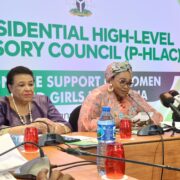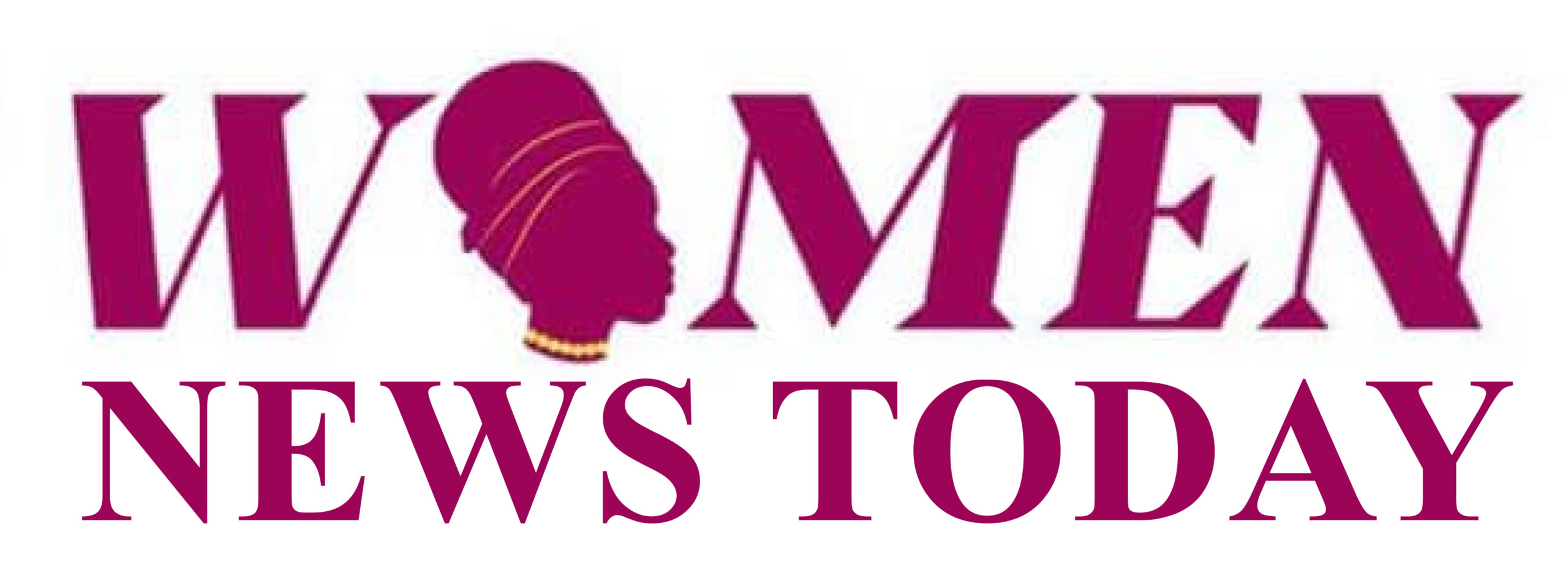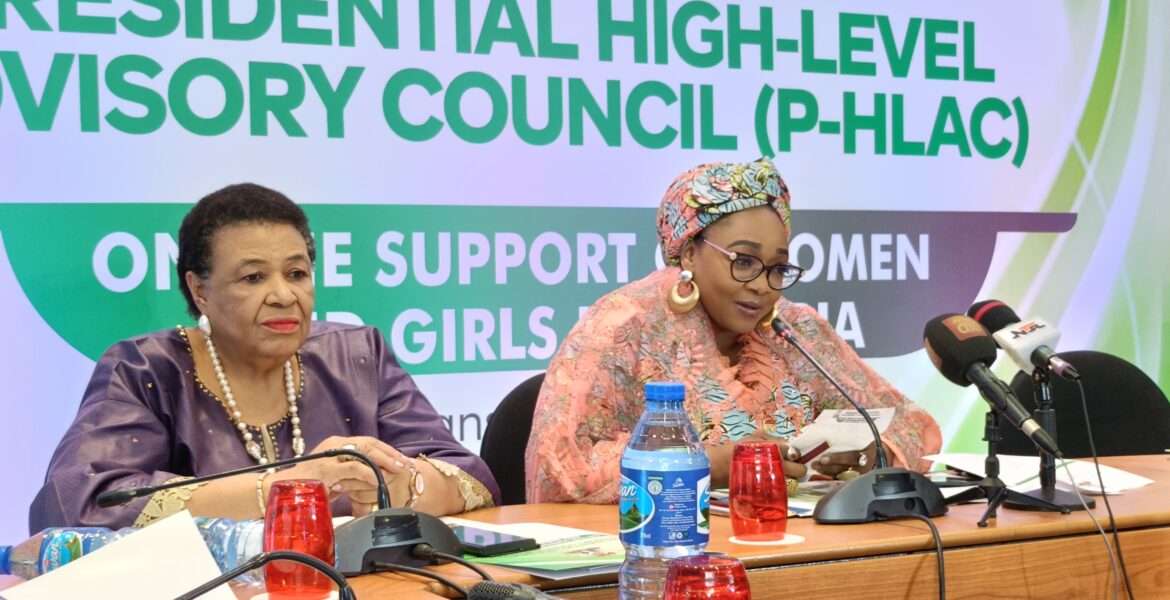The Minister of Women Affairs, Imaan Sulaiman-Ibrahim, has revealed a crucial ₦1.6 trillion financing gap needed over five years to fully implement a national strategy for women’s empowerment, urging stakeholders to move beyond talk and deliver tangible outcomes.
The Minister made this call on Thursday in Abuja at the Presidential High-Level Advisory Council (P-HLAC) on the Support of Women and Girls in Nigeria held at the Transcorp Hilton and attended by ministers, traditional rulers, development partners, and civil society representatives. It aimed to strengthen national dialogue and strategic collaboration to advance women’s empowerment and inclusion across all sectors.
Imaan Sulaiman-Ibrahim called for urgent and coordinated national action to accelerate the empowerment and inclusion of Nigerian women and girls. She urged stakeholders to move beyond commitments and deliver tangible outcomes.
According to the Minister, the gathering marked a critical moment of reflection and recommitment, coinciding with major global milestones, the 30th anniversaries of the Beijing Declaration and Platform for Action, the Women’s Rights Movement, the UN Agenda for Social Development, and the 25th anniversary of the Women, Peace, and Security agenda.
She highlighted persistent barriers faced by women and girls in Nigeria, despite progress made, noting the continuous denigrating of women to the background.
“Women make up over 50% of Nigeria’s population, yet they account for only 33% of the labour force, and less than 10% occupy senior management or board positions. Nearly 44% of girls are married before the age of 18, six out of every 10 out-of-school children are girls, and maternal mortality remains among the highest worldwide.”
“One in four girls has been sexually abused before the age of 18, and women’s political participation is critically low, with less than 5% holding elected positions nationwide. These figures are not just statistics; they represent economic losses, human capital erosion, and unrealised potential that hinder our nation’s progress.”
She outlined the Ministry’s strategic roadmap under President Bola Ahmed Tinubu’s Renewed Hope Agenda, anchored on nine key social impact programmes. These focus on economic empowerment, gender-based violence prevention, social protection, digital inclusion, and child wellbeing.
“To fully implement this roadmap, we estimate a financing need of approximately ₦1.6 trillion over five years. Bridging this gap requires deep partnerships, mobilising domestic resources, leveraging private capital, and strengthening collaboration with development partners to ensure no woman or girl is left behind.”
She emphasized the role of the P-HLAC as a high-level, multi-sectoral platform approved by the Federal Executive Council to drive coordinated policy action.
“This council unites government, private sector, civil society, traditional and faith institutions, and youth to unlock resources, track solutions, and deliver measurable improvements for women and girls. Our success will be measured not by meetings attended, but by how many state budgets reflect our priorities, how federal decisions reference our guidance, and how private sector partnerships are activated.”
The Minister issued three key calls to action. First, she stressed the need to consolidate political ownership by activating the council’s four thematic subcommittees: Women’s Economic Empowerment, Women’s Health, Women’s Rights and Safety, and Women in Politics and Leadership—as engines of innovation and accountability.
Second, she underscored the need to strengthen the council secretariat and delivery systems to ensure institutional memory and consistent follow-through.
“Finally, we must mobilise resources, as the women’s sector remains underfunded. Government leads, but we do not act alone.”
Earlier, the Coordinating Minister of Health and Social Welfare, Professor Mohammed Ali Pate, acknowledged the establishment of the P-HLAC under President Muhammadu Buhari as a landmark moment, and praised President Bola Ahmed Tinubu for reinvigorating the council to align scattered initiatives into a more strategic, high-level, multi-sectoral approach.
“Empowering women and girls is critical for many reasons, for demographic potential, improved health outcomes, and human capital accumulation, which are central to economic development. We must start with girls, women, mothers, and children.”
He stressed that investing in women’s health strengthens family stability, reduces poverty, and builds human capital from the earliest stages of life.
“Every healthy girl today becomes a productive citizen tomorrow. It starts with the adolescent girl—before conception, during gestation, and in early childhood, when the brain’s development is most critical.”
He outlined the administration’s whole-of-life-course approach under the Renewed Hope Agenda and discussed persistent issues including high maternal mortality, nearly one-fifth of all maternal deaths worldwide occur in Nigeria largely due to preventable causes and lack of access to quality reproductive health services.
He also decried gender-based violence, harmful practices like child marriage, and unequal access to nutrition, education, and healthcare.
“We debated this vigorously recently in New York with the Emir of Kano, the Attorney General, and other stakeholders. We must address these issues in a way that respects our cultural and religious contexts.”
He highlighted the Health Sector Strategic Blueprint, launched in December 2023, focused on saving lives, improving governance, and expanding equitable access to healthcare, emphasising the need for cross-sectoral collaboration.
“We aim to expand primary healthcare, reduce maternal mortality, and integrate gender into our data systems. Without data disaggregation, we’re just telling stories, not solving problems.”
“We must break silos. Ministries, civil society, private sector, and others must work together under one unified agenda.”
He reiterated the need to track progress through an accountability framework, allowing for timely corrective actions.
I’m her remarks, Special Adviser to the President on Policy and Coordination, Head, Central Delivery Coordination Unit Hadiza Bala Usman emphasized the importance of performance tracking and improvement, while urging private sector participation.
“We assess performance to enhance delivery, not to punish. Coordination is key, and I am excited to see the Minister providing the necessary drive for it.”
“You are represented at this council, this is your opportunity. Help expand the gender cluster, the childcare scope, and more. The revised HLAC structure offers great potential.”
She confirmed ongoing efforts to institutionalise coordination through a policy memo to the Federal Executive Council and reiterated her commitment to supporting the council’s success.
Also in her remarks Dr. Zainab Ibrahim, Deputy Women’s Leader of APC and IPAC stressed the need for the political inclusion of women. She noted Nigeria’s low ranking in political representation and urged stakeholders to push for improvement:
“Economic, political, and financial inclusion are interconnected. Women are grossly underrepresented politically. Without women at the decision-making table, we cannot progress.”
“Countries smaller than Nigeria have achieved over 50% women inclusion. Why not us? Political empowerment unlocks social and economic empowerment.”
She criticized the lack of female representation in national and state assemblies stating that “In some states, there’s not a single woman in the House. Even Women’s Committees are chaired by men, this is unacceptable.”
She thanked President Tinubu and Minister Sulaiman-Ibrahim for championing women’s inclusion and expressed hope for the passage of the Gender Bill.
“This bill will give us a guaranteed voice in Parliament, helping address many gender-related issues.”
In a presentation by the Gender Lead, DGA, Albright Stonebridge Group Rinmicit Temlong-Abokei noted that data reinforcing the council’s focus areas. She noted that, despite progress, Nigerian women continue to face structural barriers such as Unpaid care work, Limited financial inclusion, Poor health outcomes, Critically low leadership representation (just 4.2% of political positions)
She highlighted Nigeria’s improved ranking in economic inclusion from 49th to 24th globally and called for policies to sustain women’s workforce participation.
The Presidential High-Level Advisory Council reinforced Nigeria’s renewed commitment to gender equality and inclusive development. It marked a strategic step forward, moving from declarations to measurable action to ensure that women and girls are not only heard but empowered across all spheres of society.


